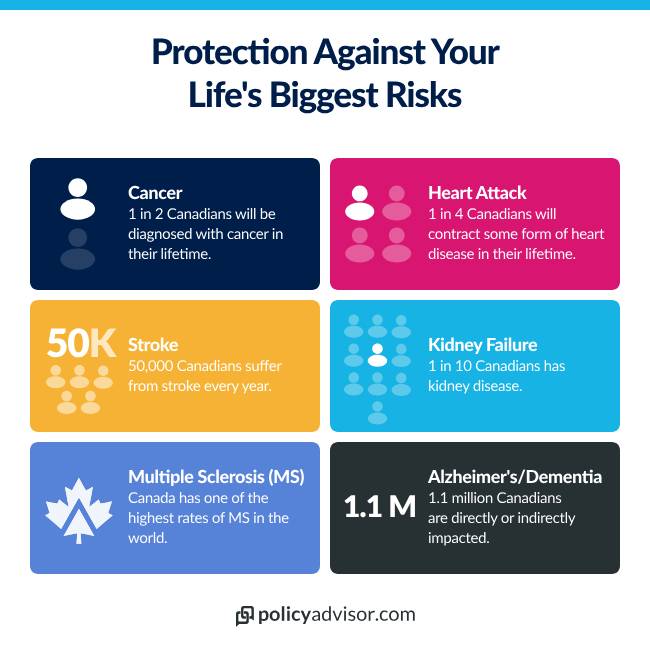Is critical illness insurance worth it?
Critical illness insurance is worth your money. It provides a one-time tax-free lump sum if you are diagnosed with a critical illness. It’s worth it to cover medical expenses and support your quality of life and recovery if you are ever diagnosed with a critical illness. It can provide financial support by covering your family’s financial needs or preventing you from having to work while ill.
- Is critical illness insurance worth it?
- Why is critical illness insurance coverage worth it?
- Critical illness insurance statistics
- Advantages of critical illness insurance
- Disadvantages of critical illness insurance
- Do you need critical illness cover?
- Is critical illness insurance worth it - Reddit
- Which is better life insurance or critical illness?
- Do I need both income protection and critical illness cover
- Is it worth paying for critical illness insurance?
Critical illness insurance policies are not discussed as much as other types of insurance like life insurance or disability insurance. However, a critical illness policy could be what stands between the insured and the possibility of financial hardship in the case of a big health emergency.
This could include many common ailments, such as a heart attack, stroke, or cancer. Even if you are covered by a group health insurance policy, the cost of treatment for these illnesses could go beyond the scale of the coverage you have.
You may think the chance of such health events happening to you is negligible and wonder if critical illness insurance is worth purchasing. But, unfortunately, nearly 50% of Canadians are prone to develop some form of cancer in their lifetime (source: Government of Canada statistics).
Is critical illness insurance worth it?
Yes, critical illness insurance coverage is worth it for all Canadians. It safeguards your financial future in the event that you are diagnosed with a critical illness. And the chances are, you will be within your lifetime.
Critical illness insurance pays you a one-time lump sum payment if you are diagnosed with a critical illness. You can use this money how ever you like in order to support your recovery.
Why is critical illness insurance coverage worth it?
Critical illness insurance is worth the cost of monthly premiums because it’s very likely that you will be payed out for your policy. In fact, over 80% of critical illness insurance policies are paid out, and that number is growing. Because this type of insurance coverage can include a variety of illnesses, chances are, you’ll have to make a claim. That means it’s worth your money.
Let’s take a look at some stats.
Critical illness insurance statistics

Advantages of critical illness insurance coverage
Critical illness insurance comes with many advantages as an insurance product beyond the high rate of payout.
- Flexibility in how benefit is used
- Premiums can be returned if there are no claims (return of premium rider)
- Ability to get coverage as a rider or separate policy
- Ability to convert to permanent coverage
Disadvantages of critical illness insurance coverage
While critical illness insurance is a great product, there are some aspects that some may find negative.
- More expensive than life insurance
- More stringent underwriting guidelines
- Strict claims process (you must have an official diagnosis, which may take time)
Do you need critical illness insurance cover?
Regardless of any disadvantages of the product, the rate at which you are likely to get paid out for this policy makes this policy worth it—it’s a very low-risk gamble compared to other insurance products. Critical illness insurance provides a different type of peace-of-mind than other insurance categories like term life or whole life insurance. If you worry about your quality of life after a health scare, how a sickness could affect your family’s financial well-being, or having to work through an illness thus delaying or hampering your recovery, then critical illness can definitely be considered worth it.
What others say about critical illness insurance
At PolicyAdvisor, we believe that critical illness insurance is worth your money. But we understand you may want other opinions. Here’s what some are saying about critical illness insurance in Canada.
Is critical illness insurance worth it in Canada – Reddit
Check out this take from a Reddit user.


Source: https://www.reddit.com/r/PersonalFinanceCanada/comments/mrt9ef/is_critical_illness_insurance_worth_it/?rdt=43691
The views expressed in these reviews/forums are from the respective posters and NOT the opinion of PolicyAdvisor.com.


Source: https://www.reddit.com/r/PersonalFinanceCanada/comments/txupfz/doing_the_math_on_critical_illness_insurance/
The views expressed in these reviews/forums are from the respective posters and NOT the opinion of PolicyAdvisor.com.
Which is better life insurance or critical illness?
Life insurance and critical illness insurance are completely different insurance products that serve different purposes.
Life insurance: pays out a death benefit to your beneficiaries when you pass away
Critical illness insurance: pays out a benefit to you (the policyholder) if you are diagnosed with a critical illness
In the context of permanent (or whole life) coverage, permanent life insurance is more of a guaranteed product than critical illness, because one day you will pass away, but you may not necessarily be diagnosed with a critical illness. But that doesn’t make it a better product than critical illness insurance.
Both policies are important to have when considering the financial future of your family. Critical illness insurance will financially support your family if you are recovering where as life insurance will take care of your family if you have passed away.
Do I need both income protection and critical illness cover?
Income protection and critical illness insurance cover are two different insurance products that have different purposes.
Income loss protection or job loss insurance: pays out a benefit if you lose your job
Critical illness insurance: pays out a benefit to you (the policyholder) if you are diagnosed with a critical illness
Disability insurance: replaces a portion of your income if you are sick or injured and cannot work for a short or long period of time (depending on the policy). This is different from job loss insurance as you are only temporarily off work.
Disability insurance will replace your income while you’re off work due to a critical illness, whereas critical illness insurance will pay you a one-time lump sum payment when you are diagnosed with that illness. We recommend both products to ensure your full financial security during your recovery period.
What to look for in a critical illness insurance policy
Every person has unique financial needs and goals. When selecting a critical illness policy and deciding if its worth it for your family, you should consider what your ideal financial outcomes are.
To give you a better idea of how to select the best critical illness insurance policy, here’s is a breakdown of policy benefits you should look for:
Several Canadian insurance providers offer different types of critical insurance policies. Each of these policies has its own merits and drawbacks. PolicyAdvisor has reviewed all the major critical illness insurance offerings in Canada. In doing so, we come up with a list of features, details, and options Canadians should look for when shopping for their own critical illness coverage.
It may be the case that every feature is available in one policy, but with the help of an experienced insurance broker, you can find the coverage that is best for you.
Is it worth paying for critical illness insurance?
Yes, in general, it is worth it to buy critical illness insurance. The coverage starts from as low as $20 per month, but it and may go up to as high as a few hundred dollars a month. If you’re worried about it not being worthwhile, you may consider purchasing a return of premium rider. This rider will return your premiums back to you if no claim was made during the policy term or at death if no claims were made during the policyholder’s life.
The bottomline is, if you can’t afford the monthly premium, it is not worth it. But if you can, then this insurance is well-worth the monthly premium. You already know the likelihood of being diagnosed with a critical illness in your lifetime (80%), so it is worth it to make sure you will at least be financially secure while you recover.
In Canada, the average life expectancy is 83 years. Healthcare is world-class. Apart from healthcare facilities, there are renowned lab and research facilities. Despite having all this, one can not deny the toll that lengthy treatment takes on one’s financial condition. Recovery from life-threatening diseases is also often about care and facilities being made available for a longer than normal period. Critical illness insurance is worth its money in cases like these where one does not need to put the concern about receding income as a hurdle on the way to recovery.
Find out if critical illness insurance is worth it for your family
Those seeking coverage should consider this carefully and choose the policy (or critical illness insurance rider) that suits them best, considering both their coverage requirements and their budget. Better yet, get in touch with one of our experienced advisors to help educate you on your options.
- Critical illness insurance widely covers many illnesses and circumstances for Canadians that provincial health plans or employee medical benefits may not.
- Critical illness insurance is worth it as such illnesses are quite common in Canada
- The coverage can soften the financial blow that accompanies a major medical event


 1-888-601-9980
1-888-601-9980

